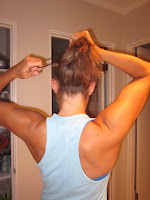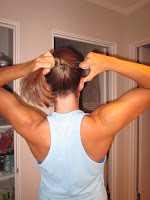I was suddenly very aware of the fact that I was not in a state-of-the-art athletic training center. I was in another hospital surrounded with people who had sever brain injuries. I had done a little therapy in my first hospital, just "walking" and practicing brushing my teeth and hair with my right/"bad" hand. Though I could barely walk, and barely brush my teeth and hair, I still envisioned myself running laps and hand writing a term paper in weeks. That was not so much the case. I had to come face to face with my 'disabilities.' (I really hate using that word because I don't, and have never, thought of myself as disabled). DEaling with my own problems was intense enough but what really made an impact on me was what I saw every day. Every day my heart would break, and every day I had a new ridiculous story. I feel like being in the brain trauma unit of a therapy hospital and being comprehensive is honestly like witnessing a different world that many don't even know exist!
Therapy Hospital - The Saga Begins
 |
| View from my room at my therapy hospital |
I arrived at the therapy hospital in complete shock. Like I said, I had no idea that this was what it was. I thought I would get right to work doing therapy...not so much. I was put in my bed that was next to my new roommate's bed. The only thing separating us was the same type of hospital curtain you see at any hospital. She wasn't there when I got there as she was at therapy, but in her absence disco music was blaring from a little radio next to her bed. I was immediately worried. I was told that she was an 80-something year old woman named Connie who wasn't completely 'with it.' Aaaand more worried. I never REALLY interacted with Connie, but I came to LOVE listening to her!
Connie was hysterical. No, she wasn't really with it, but she was cognitive enough to talk to everyone who interacted with her. Every morning when the nurses would come in and get her ready for her day, they would obviously move her around, getting her washed and dressed, and I would hear her from the other side of the curtain saying in a thick Long Island accent, "Aaaah take it easyyyy! I'm an old laaadddyyy!!!" and when the nurses would ask her something, like what shirt she wanted to wear, or if she wanted to eat breakfast, she would always reply with, "oh whatevaah!"
One day, one of Connie's daughters was there (who were both wonderful women) Connie was kind of babbling, not saying anything sensible, she suddenly broke out into some sort of Italian song. It was actually pretty amazing that she pulled an entire song in another language from her memory during a moment where it seemed like there wasn't a whole lot going on. It was also quite cute.
Every other day, a doctor would come into the room and do mental exercises with Connie. I felt so lucky when I was in the room when this would happen! It was usually an exercise where the doctor/therapist, would read some sort of sentence or catch phrase and Connie would have to fill in a word. Normally, she was very good at this. The therapist would say things like "Ok Connie, finish the sentence: the radio isn't loud enough; please turn it..." and Connie would say, "up!" Connie got really good at this little game, advancing to harder sentences. Some would say that Connie just couldn't handle this exercise very well, but I kind of think that maybe she was just messing with the therapist. One day, the therapist said "Connie, finish the sentence: Jack and Jill ran up the...." and Connie finished the sentence with,"Tunnel of loooove!!" another time, while playing the same game, the therapist said "It is raining cats and...." and Connie replied "Paaancakes!!"
Connie left to go to a less intense therapy hospital after about 2 weeks of me being there. I was honestly sad to see her go. I didn't know this at the time, but she was the perfect hospital roommate. She slept through the night, didn't say much, and when she spoke up, it provided me with such entertainment! My next roommate, honestly bless her heart, wasn't quite as low-maintenance (more on that later). Connie, though she didn't know it, helped to keep my mood light in a time that I was starting to sink into a dark hole.
I could write a book about my experience at therapy hospital, from people ODing on drugs, and trying to commit suicide, to people who just had awful, life hanging things happen to them. I also witnessed things that were probably ultimately sad (more on that in another post!), but really, all you can do is laugh.



















